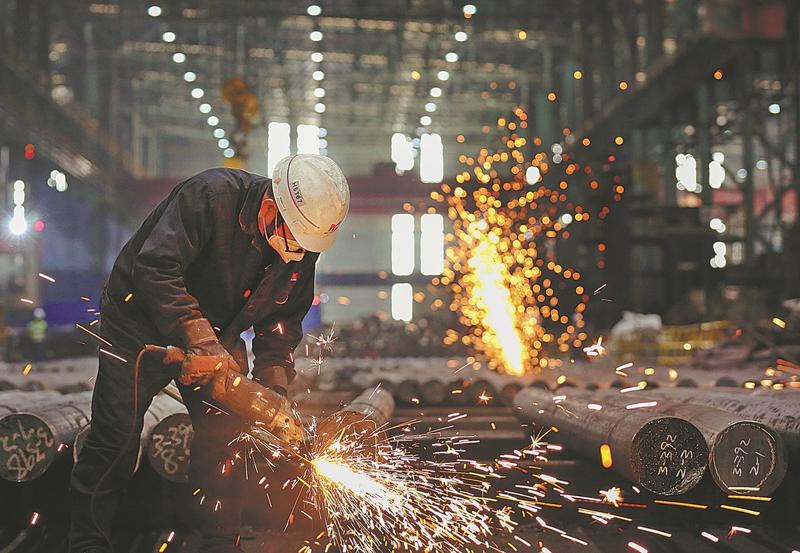 A worker performs finishing work on steel billets at a special steel company in Ma'anshan, Anhui province, on March 30. (LUO JISHENG / FOR CHINA DAILY)
A worker performs finishing work on steel billets at a special steel company in Ma'anshan, Anhui province, on March 30. (LUO JISHENG / FOR CHINA DAILY)
The country's top policymakers have signaled the actions they will take in response to the mounting pressure on the economy.
Highlighting infrastructure's role as a pillar of economic and social development, a key Party meeting on Tuesday called for the comprehensive bolstering of infrastructure construction nationwide, identifying several sectors such as transport and energy where an infrastructure boost was needed, including the construction of new ports and airports as well as the development of a smart grid and a series of new green, low-carbon energy bases.
The meeting of the Central Committee for Financial and Economic Affairs also said that efforts should be made to strengthen the infrastructure construction for the upgrading of the information, sci-tech and logistics industries, as well as the building of facilities for a new generation of supercomputing, cloud computing, artificial intelligence platforms and broadband networks.
The push to ramp up spending on infrastructure followed the issuing of a document by the State Council, China's Cabinet, on Monday. The document set out the policies and measures it was proposing to boost the recovery of consumption and remove the production, distribution and circulation bottlenecks that have appeared as a result of the COVID-19 pandemic.
The recent difficulties show that there must be coordination among different localities to ensure the national logistics system is not blocked, and local governments must avoid putting epidemic prevention and control measures at odds with development.
At the same time, in order to boost consumption and create jobs, the country must stabilize market entities. Policymakers need to step up the assistance given to businesses, especially small and medium-sized enterprises. There should be well-targeted policies to support small and micro enterprises and individual businesses. In particular, rescue measures are urgently needed to provide support to those in the catering, retail, tourism, civil aviation, highway, waterway and railway transport industries that have been hard hit by the pandemic.
The country should demonstrate as much resolve in firing up the engine of consumption as it has shown in fighting the virus, and strive to keep a good balance between the two tasks, so that the market can have confidence that the baby will not be thrown out with the bathwater.
The fundamentals of the economy are still sound, and it is the resurgence of the novel coronavirus that has had the biggest impact on it. Once the disruptions in logistics and other problems are solved, enterprises will be able to resume work and production, and economic operations will return to normal.
Meanwhile, as well as providing a boost to the economy, strengthening infrastructure construction will promote high-quality development by accelerating the actualization of the "dual circulation" development paradigm.


